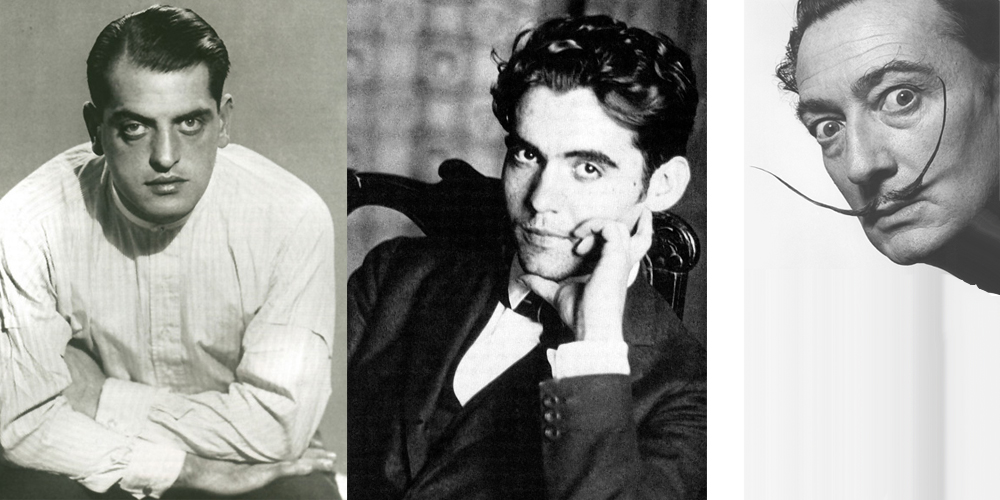The most popular DVDs in our library
A very important part of Instituto Cervantes in London is our library and the movies available to borrow in DVD. We introduce in this post a selection of the most popular ones among our users:
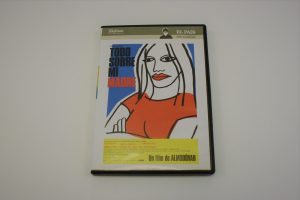
All About My Mother is a film by Pedro Almodóvar. A Greek saying states that only women who have washed their eyes with tears can see clearly. This saying does not hold true for Manuela. The night a car ran over her son Esteban, Manuela cried until her eyes ran completely dry. Far from seeing clearly, the present and the future become mixed up in darkness.
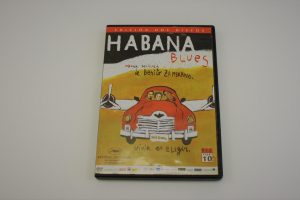
Havana Blues is a 2005 Spanish and Cuban film by Benito Zambrano, which tells the story of two young musicians in Cuba. The film revolves around their music and contains criticism of problems in Cuba such as poverty and electricity outages.
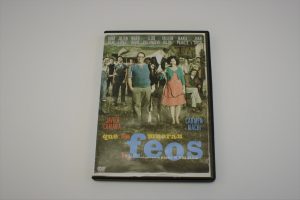
To Hell With The Ugly is a film by Nacho Garcia Velilla. Eliseo (Javier Cámara) is ugly, lame and single. He still hasn’t found the woman of his dreams and he doesn’t really know what love is. Nati (Carmen Machi) is similarly ugly and is currently separated. She’s just met the man of her dreams but she doesn’t know what real love is either. Eliseo, on the other hand, fears that the worst is just around the corner, whilst Nati fantasises that the best is yet to come.
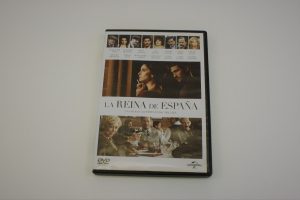
The Queen of Spain is a film by Fernando Trueba. Eighteen years after fleeing Nazi Germany, Spanish film actress Macarena Granada becomes a major Hollywood star. She returns to Spain to play Isabella I of Castille, surrounded by showbiz hype.
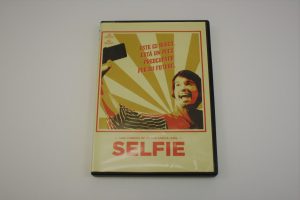
Selfie is a movie by Víctor García León. A privileged young man in Madrid gets a reality check when his father is arrested on corruption charges and all of the family’s assets are seized.

Skins is a film by Eduardo Casanova. Deformed, disfigured characters must find a way to deal with society shunning their differences.
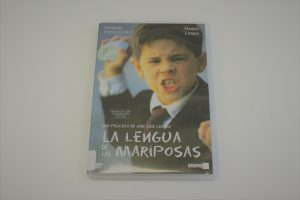
Butterfly’s Tongue is a film by José Luis Cuerda. The heartwarming story of the relationship that develops between a shy young boy and his kind teacher in 1936 Spain. The boy, Moncho, is frightened about starting school, and it is up to the gentle, compassionate Don Gregorio to set the boy’s mind at ease. When the Spanish Civil War erupts, both individuals’ lives are changed forever.
Los DVD más populares de nuestra biblioteca
Una parte muy importante de la biblioteca del Instituto Cervantes en Londres es la sección de películas en DVD. Os presentamos una selección de las más prestadas y las más populares entre nuestros usuarios:

Todo sobre mi madre es una película de Pedro Almodóvar. Un dicho griego dice que solo las mujeres que se han lavado los ojos con lágrimas pueden ver con claridad. Este dicho no es válido para Manuela. La noche que un automóvil atropelló a su hijo Esteban, Manuela lloró hasta que sus ojos se secaron por completo. Lejos de ver claramente, el presente y el futuro se mezclan en la oscuridad.

Habana Blues es una película hispanocubana de 2005 de Benito Zambrano, que cuenta la historia de dos músicos jóvenes en Cuba. La película gira en torno a su música y contiene críticas a los problemas en Cuba, como la pobreza y los cortes de electricidad.

Qué se mueran los feos es una película de Nacho García Velilla. Eliseo (Javier Cámara) es feo, cojo y soltero. Todavía no ha encontrado a la mujer de sus sueños y realmente no sabe qué es el amor. Nati (Carmen Machi) es también fea y actualmente está separada. Acaba de conocer al hombre de sus sueños, pero tampoco sabe qué es el verdadero amor. Eliseo, por otro lado, teme que lo peor esté a la vuelta de la esquina, mientras que Nati fantasea con que lo mejor está por venir.

La Reina de España es una película de Fernando Trueba. Dieciocho años después de huir de la Alemania nazi, la actriz española Macarena Granada se convierte en una gran estrella de Hollywood. y regresa a España para interpretar a Isabel I de Castilla, rodeada de exageraciones publicitarias.

Selfie es una película de Víctor García León. Un joven privilegiado en Madrid recibe una verificación de la realidad cuando su padre es arrestado por cargos de corrupción y todos los bienes de la familia son incautados.

Pieles es una película de Eduardo Casanova. Los personajes deformados y desfigurados deben encontrar una manera de lidiar con la sociedad evitando sus diferencias.

La lengua de las mariposas es una película de José Luis Cuerda. La conmovedora historia de la relación que se desarrolla entre un niño tímido y su amable maestro en la España de 1936 . El niño, Moncho, tiene miedo de comenzar la escuela, y le corresponde al gentil y compasivo Don Gregorio tranquilizarlo. Cuando estalla la Guerra Civil española, las vidas de ambos individuos cambian para siempre
Five recent Galician short films to be screened at the 11th Galician Film Forum in London

The Galician Film Forum (GFF) will celebrate its 11th event, titled ‘Shorts Edition’, with a programme focused on Galician short films that have been released recently. The event will take place on Friday 22 November at King’s College London [19 h, Edmond J Safra Theatre, Strand Campus, WC2R 2LS]. The films that have been selected for the event are ‘A nena azul’ by Sandra Sánchez, ‘Marusía’ by Pedro Sancho, ‘Soy una tumba’ by Khris Cembe, ‘Limbo’ by Daniel Viqueira and ‘Beautiful Boy’ by Fran X. Rodríguez. After the screening, the audience will have the opportunity to speak with director and film editor Sandra Sánchez, who will be in London to participate in this event.
As is usual, all of the films will be screened in Galician with subtitles in English and the event will take place in English and Galician. Tickets are free, but it is essential to reserve them in advance at this link. The eleventh edition of the GFF has been made possible thanks to support from the Department of Spanish, Portuguese and Latin American Studies at King’s College London, sponsorship from ABANCA and collaboration from the Office for Cultural & Scientific Affairs at the Spanish Embassy in London.
This Shorts Edition will bring a range of recent Galician short films to London. With fiction as the main thread running through the selection of films, the audience will have the opportunity to watch films that are full of humour like “Beautiful Boy” and “Marusia”. There will also be space for poetic reflection, as in “A nena azul”, and even some short films which are quite unconventional for this genre in Galicia, like animation and terror, with “Soy una tumba” and “Limbo” standing as good examples.
Award-winning short films
As well as having been released recently, the films that will be screened at the Galician Film Forum share in having had significant success at film festivals. In this regard, the successes of ‘Limbo’ must be underlined. ‘Limbo’ has participated in more than a hundred festivals and has received twenty prizes to date, including best short film at Grimmfest Manchester’s Festival of Fantastic Films; best director at Cryptshow Festival; the Calaverita de Bronce at the Morbido Film Fest; the Young Jury award at the Festival Ibérico de Cinema, Best Short Film at Terroríficamente Cortos and the award for Scariest Film at the Desmond District Demons, amongst others.
The success of ‘Soy una tumba’ also deserves a special mention since, as well as having been nominated for Best animated short film at the Goya awards this year, it continues to win awards as it goes around different festivals. Some of these awards include Best Animated Short at the XVII Premios Mestre Mateo; Best Animated Short at the Festival de Cortometrajes La Fila de Valladolid; Best National Short Film at Cortoons Gandia 2019; Best National Short Film and Best Animated Short Film at the Festival Nacional de Ciudad de Ávila Ávilacine; Best Script at Anima Deba Animazio Zinemaldia; first prize at Ourense Film Festival; and best animated short film at the XX Festival de Cortometrajes Asier Errasti, to cite just a few.
‘A nena azul’ lands in London having won the Special Mention prize from the jury at Planeta GZ and the Premio award for best directing Gallega XV at the Curtocircuito International Film Festival (Santiago de Compostela); the Mestre Mateo award for Best Short Film at the XVII edition of this ceremony which is organised by the Galician Audiovisual Academy. It has also won prizes for Best Photography and Best Sound at the VI National Festival of Short Films in Talavera de la Reina (Madrid).
With regards to ‘Beautiful Boy’, it has been recognised on several occasions, winning the audience prize for example at the XVI Festival de Cans and Primavera do Cine. It has also received awards like the prize for Best Script at the Mostra de Curtas Vila de Noia. To close, ‘Marusía’, the most recent of the short films that the Galician Film Forum will be screening, won its first international award at the 8th Resistencia Film Festival de Chile and won, in October, the Audience Award for Best Galician Short Film at the XLI Semana del Cine de Lugo.
Atlantic Gaze
The guest of honour at this edition of the Galician Film Forum is the director and producer Sandra Sánchez. In 2011 she presented her most personal project, a documentary called “Tralas luces”, which took four years to make and was premiered in the section for new directors at the Festival de San Sebastián. Sánchez then continued working as a producer on a variety of series, documentaries and films like ‘Migas de pan’, ‘Esquece Monelos’, ‘Querida Gina’ and ‘Rafael’. She also directed the short films ‘Matías’, which appeared at Chanfaina Lab, and ‘A nena azul’.
Sandra Sánchez is currently working in the Laboratory for Audiovisual Production at the Scientific Museums of A Coruña and she is writing the script for what will be her first feature-length fiction film, ‘La nadadora’, a project intimately linked to ‘A nena azul’ because both films have the same protagonist.
Galician Film Forum
The GFF started in 2015 when a group of Galicians living in London came together to create a space for Galician cinema in the British capital. It functions in three different ways: as an exhibition platform, as an observatory for the new creative audiovisual diaspora in the UK and as a space for reflecting on Galician cinema and culture in universal terms.
- Tickets: https://gffshortsedition.eventbrite.co.uk
- A nena azul: http://anenaazul.com/
- Limbo: https://www.facebook.com/curtametraxelimbo
- Soy una tumba: https://www.facebook.com/soyunatumba/
- Marusía: https://www.facebook.com/contarteproduce/
- Beautiful Boy: https://www.nenobonito.info/
«We film little, and in these times, it is also a declaration of principles»
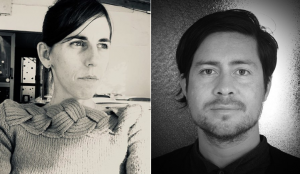
We interview filmmakers Teresa Arredondo and Carlos Vásquez Méndez after the premiere of their movie The Crosses at Open City Documentary Festival in London. Arredondo is a psychologist and filmmaker, her work in cinema revolves around the autobiographical. Her first work is a portrait of the last years of her grandmother, writer Matilde Ladrón de Guevara. Her first feature film, Sibila, received numerous awards at festivals around the world. She is a FIDOCS programmer and is co-founder of the Laguna Negra studio with Vásquez, with whom she develops different experimental and essay documentary film projects.
In the case of Vásquez, he is an artist and researcher. He uses cinema and photography from documentaries and an experimental perspective, establishing constant correspondences between artistic practice, social sciences, analog and digital. His works have been exhibited in various exhibitions and festivals. In 2016 his film [Pewen] Araucaria received the Joris Ivens / Center National des Artes Plastiques (France). With a bachelor of Cinema, a Master of Creation Documentary (IDEC / UPF) and a Master of Contemporary Artistic Creation (UB), he is currently developing his doctoral research.
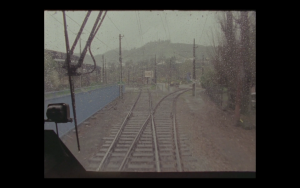
1. What does it mean for you to present Las Cruces in London?
It is our premiere in the UK, it is always interesting to hear the opinions of audiences other than Chilean and Latin American, who unfortunately share a dark part of our recent past and take the history of the film to our particular territories. That is why it is important to contrast the universality of this story about these heinous crimes, which although it arose in a particular context, speak of the banality of evil, about the economic sector as the factual power, about how the official history is written from the spheres of power.
2. What was the reception like in the United Kingdom?
In the Bertha DocHouse room all tickets were sold, we were surprised by the response of the London audience.
3. Las Cruces was recorded in 16mm, why this format?
We work in 16mm because we both learned cinema at film school – we understand cinema in this format and we are still trying to remain faithful to this material. More than a fascination for the plastic characteristics of the film image, we are interested in the methodology involved, the material is expensive, scarce and delicate, it forces us to prepare a lot every shot, rehearse, be very concentrated, film little. And in these times, it is also a declaration of principles: let’s say it is a conscious position as opposed to the banalization of images in the era of social networks.
4. Why did you decide to make this documentary?
This case has several peculiarities with respect to the totality of crimes of the dictatorship. The first is the participation of private in the crimes, the second is that there are confessions of the perpetrators, the third is the time that justice has been taken in issuing a sentence and this is a very symptomatic detail of the symbolic relevance of this case. Because it would be the first time that a company of a powerful family is imputed as a direct accomplice of crimes of disappearance and murder of Chilean citizens for their political ideas.
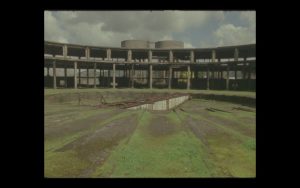
5. What was the response among the relatives of the 19 murdered?
They always agreed with the project, although we gave voice to the testimonies of the murderers instead of theirs. From the beginning they understood the central idea of the film and collaborated in every world without impositions or any conditions. They helped in the election of the inhabitants of the town who read the judicial documents, since the only condition we put to the relatives was that we did not want to expose them or submit them for reading in front of the camera. Our intention was to take care of them, work alongside them, not use their suffering.
6. What are you working on now?
The next thing is an exhibition in Port Bou at the end of September around the figure of Walter Benjamin and his tragic death. I have prepared a film piece – experimental medium-length film – about his trip through the Eastern Pyrenees before his life was taken away. With Teresa, the co-director of Las Cruces, we are working on three new projects together. The new pieces focus on the treaties on colonial history in Chile, from Spanish colonization to the planned colonization of citizens of northern Europe in the 19th century and the current post and neo-colonization of the most peripheral provinces. We have a studio called Laguna Negra, after Las Cruces, we really want to get a new movie together soon, hopefully we’ll have something next year.
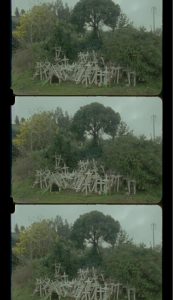
«Filmamos poco, y eso en estos tiempos es una declaración de principios»


Cinema in Spanish stands out in the month of festivals in London
This September, Instituto Cervantes offers a range of events which highlight the support for the presence of Spanish-speaking films and filmmakers in the British capital’s most important festivals and artistic venues (BFI, Open City Documentary Festival, LUX, Tate Modern, Institute of Contemporary Arts, London Spanish Film Festival and Raindance Film Festival).
“The vitality of cinema in Spanish is one of the features that define the current state of cinema in the world. And a cinema with a global appeal, such as ours, must be shown in a global capital such as London,” says Ignacio Peyró, director of Instituto Cervantes in the British capital.
Thanks to Instituto Cervantes, Spanish and Latin-American filmmakers can be part of a range of prestigious festivals held in London, thus increasing the visibility of the productions shot in Spain – be it in Spanish or co-official languages - and Latin America, Peyró adds.
Open City Documentary Festival: A 40-year unsolved mystery
The month begins with the screening of the Chilean documentary feature «The Crosses» and the subsequent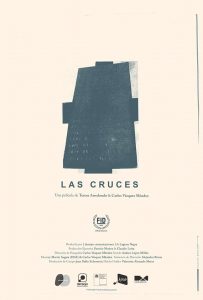 colloquium with the directors Teresa Arredondo and Carlos Vásquez Méndez, on Sunday, September 8 at 1:45 pm, in the Open City Documentary Festival program.
colloquium with the directors Teresa Arredondo and Carlos Vásquez Méndez, on Sunday, September 8 at 1:45 pm, in the Open City Documentary Festival program.
This will be the premiere of Las Cruces in the United Kingdom, which is set only a few days after the 1973 military coup against the Allende government in Chile, when a group of 19 union members in a paper mill disappeared without a trace.
The case was a mystery for 40 years, until a police officer involved in the massacre finally broke the pact of silence. Hearing his confession alongside the testimony of the families of the victims, the filmmakers decipher the events that led to the murders, using 16 mm photographs to represent the landscape as a crime scene.
LUX: Artists works based in the United Kingdom

On Sunday, September 15 at 7:00 pm, a screening of the new works of directors Carla Andrade and Gerard Ortín takes place, with a subsequent colloquium, in the context of LUX New Work screening series, showcasing recent work by artists based in the UK.
Their work is concerned with ideas of landscape, but whereas Andrade is drawn to non-domesticated nature for its unattainability and unownability, Ortín Castellví’s work problematizes the idea of “nature” itself as well as its imagery, often looking at human and more-than-human relations.
They both work across media, with a focus on the moving image. At LUX, a selection of recent works by both artists will be screened followed by a conversation between them and María Palacios Cruz (LUX).
Berwick Film & Media Arts Festival 2019: A dialogue between cultures

Barcelona-based filmmaker Carlos Casas presents the film «Cemetery», a total and hypnotic immersion in the jungle, on the trail of the elephant graveyard, then participates in a colloquium at the Tate Modern contemporary art gallery next Wednesday, September 18 September, at 6:30 pm, at the Berwick Film & Media Arts Festival 2019.
Artist Casas returns to Tate Modern to present the UK premiere of his award-winning feature Cemetery. This deeply sensory film follows an elephant, a mahout and the poachers in their pursuit as they move toward the mythical place known as the elephant graveyard. As the journey transitions from the jungle through stages of death, images begin to fall away, opening onto a rich sonic landscape.
Ten years in the making, Cemetery weaves together field recordings from around the globe, recorded and mixed by wildlife sound expert Chris Watson with the collaboration of professor Tony Myatt (spatialisation and Ambisonics). Finding a striking juncture between nature documentary, experimental film, road movie and soundscape, the film opens up questions about life cycles and memory, colonialism and extinction, conservation and the environment and interspecies relationships.
ICA: The portrait of the youth of a Madrid neighborhood
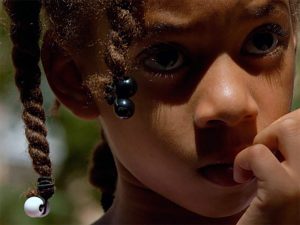
Pontevedra director Carmen Bellas will participate in a colloquium at the Institute of Contemporary Arts in London (ICA), after the screening of her acclaimed short film «When we were wild», on September 22 at 8:30 pm.
«Being able to screen the film in London is very exciting; it brings us closer to different audiences and thanks to them we can capture other nuances of our project,» explains Bellas.
Once we were wild, a portrait of the young people of a San Cristóbal neighbourhood on the outskirts of Madrid, won the prized Caracola in the feature film category at the 49th edition of the Reach Documentary Festival. This unique and suggestive representation of place progressively abandons a classic documentary structure to become a first person essay.
Raindance Film Festival: The life of Ara Malikian, uncovered

This year, the Cervantes Institute in London also collaborates with the Raindance Film Festival, a prestigious independent film festival, with the screening of the documentary «Ara Malikian: a life between the ropes» and subsequent colloquium with the director Nata Moreno, which takes place on Tuesday 24 September, at 6:00 pm.
The play portrays the versatile violinist Ara Malikian, whose life was saved by music when he fled the war and left Beirut at age 14. Since then he has lived as a nomad carrying his music all over the world. The spectator follows Ara Malikian and his entire team during their last symphonic tour of Spain and countries such as France, China, Argentina and Germany
Moreno is the stage director of the shows of the Malikian, as well as creator and producer of her [JR5] [PE-AT6] music videos and campaigns. In 2016, she set up her own production company Kokoro Films with whichs she carries out various advertising campaigns and personal projects.
Raindance Film Festival: A black comedy with a star cast
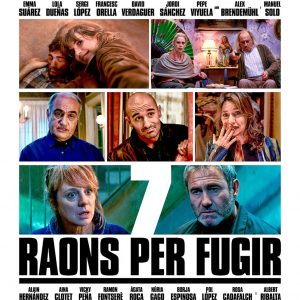 On Thursday, September 26, at 7:45 p.m., the UK premiere of the Catalan comedy «7 raons per fugir», by Gerard Quinto, Esteve Soler, David Torras, followed by a discussion with one of the filmmakers, which is part of the Raindance Film Festival.
On Thursday, September 26, at 7:45 p.m., the UK premiere of the Catalan comedy «7 raons per fugir», by Gerard Quinto, Esteve Soler, David Torras, followed by a discussion with one of the filmmakers, which is part of the Raindance Film Festival.
Soler adapts his own theatrical texts to give way to a black comedy with a star cast in which the dehumanization of the society in which we live is treated through everyday situations that deform.
The family, the poor kid who appears on TV, the sixth-floor neighbours, the tenant and the real estate agent, the business couple, the guy progress has run over and the couple about to get married. Seven stories that intertwine horror and comedy. Seven scenes of black humour as strange as they are unexpected. Seven surreal perspectives on a society that can’t progress, a dysfunctional society.
Showing at the London Spanish Film Festival

The month of September ends with the participation of the Cervantes Institute in the acclaimed London Spanish Film Festival through two screenings. First, on September 26 at 6:30 pm the documentary Peret will be screened, “Peret: the King of the Gypsy Rumba”, by Paloma Zapata, niece of the acclaimed and respected artist.
Winner of the Best International Film at the MUVI Music Film Festival 2019, it is a must for music lovers. This is an intimate portrait and at the same time a tribute to Pere Pubill Calaf, Peret for the whole world, the king of Catalan rumba for history raised in the humble neighborhood of Sant Antoni, in Barcelona.
Finally, on September 28, at 4:00 pm, the Galician screening of Trinta lumes and a colloquium with its director, Pontevedra Diana Toucedo, takes place. Recorded in the Galician region of O Courel, the director takes us to her roots and shows the reality of the Galician community from the eyes of Alba, the protagonist of this film. A work that foregrounds issues of life and death, delving into the past with a look at the present.
El cine en español protagoniza el mes de los festivales en Londres
El Instituto Cervantes de Londres cuenta con un programa cultural este mes de septiembre en el que destaca el apoyo a la presencia de películas y cineastas hispanohablantes en los festivales y salas más importantes de la capital británica (BFI, Open City Documentary Festival, LUX, Tate Modern, Institute of Contemporary Arts, London Spanish Film Festival y Raindance Film Festival).
“La vitalidad del cine en español es uno de los rasgos que definen el actual momento del cine en el mundo. Y un cine con vocación global, como es el nuestro, debe mostrarse en una capital global como es Londres”, afirma Ignacio Peyró, director del Instituto Cervantes en la capital británica.
Gracias al Instituto Cervantes, cineastas españoles e hispanoamericanos pueden formar parte de gran parte de festivales de prestigio celebrados en Londres, aumentando así la visibilidad de las producciones rodadas en España –sea en castellano o lenguas cooficiales- e Hispanoamérica, añade Peyró.

Las cruces (2018)
Open City Documentary Festival: Un misterio sin resolver 40 años
El mes comienza con la proyección del largometraje documental chileno Las cruces y el posterior coloquio con los directores Teresa Arredondo y Carlos Vásquez Méndez, el domingo 8 de septiembre a la 1:45 pm, dentro del programa del Open City Documentary Festival.
Este será el estreno de Las cruces en Reino Unido, que sitúa la acción solo unos días después del golpe militar de 1973 contra el gobierno de Allende en Chile, cuando un grupo de 19 miembros sindicales en una fábrica de papel desaparecieron sin dejar rastro.
El caso fue un misterio durante 40 años, hasta que un policía involucrado en la masacre finalmente rompió el pacto de silencio. Tomando su confesión junto con el testimonio de las familias de las víctimas, los cineastas descifran los eventos que condujeron a los asesinatos, usando fotografías de 16 mm para representar el paisaje como una escena del crimen.
LUX: Trabajos de artistas con sede en el Reino Unido

Reserve (Gerard Ortín Castellví, 2017-2019) y El paisaje está vacío y el vacío es paisaje (Carla Andrade, 2017)
El domingo 15 de septiembre a las 7:00 pm tiene lugar la proyección, con posterior coloquio, de los Nuevos trabajos de los directores Carla Andrade y Gerard Ortín, dentro del programa de LUX, la agencia de arte internacional que apoya las prácticas de imagen en movimiento de los artistas y las ideas que las rodean.
La viguesa Andrade y el barcelonés Castellví son graduados españoles del título de Cine de Artistas e Imagen en Movimiento en Goldsmiths, Universidad de Londres. Su trabajo está enfocado hacia conceptos paisajísticos. Mientras que Andrade se siente atraído por la naturaleza salvaje por su inalcanzabilidad e imposibilidad, el trabajo de Ortín problematiza la idea de la «naturaleza» en sí misma, en un imaginario no siempre enfocado hacia las ideas humanas de naturaleza.
Ambos trabajan a través de los medios de comunicación, con un enfoque en la imagen en movimiento. Dentro del contexto de la serie de proyecciones New Work en Lux, se proyectará una selección de obras recientes de ambos artistas seguida de una conversación entre ellos y María Palacios Cruz.
Berwick Film & Media Arts Festival 2019: Un diálogo entre culturas

Cemetery, film still (2019)
En el caso del cineasta barcelonés Carlos Casas presenta la película Cemetery, una inmersión total e hipnótica en la jungla, tras la pista del cementerio de elefantes, y participa acto seguido en un coloquio en la galería de arte contemporáneo Tate Modern el próximo miércoles 18 de septiembre, a las 6:30 pm, dentro del Berwick Film & Media Arts Festival 2019.
Esta película profundamente sensorial sigue a un elefante, un mahout y los cazadores furtivos en su búsqueda mientras se mueven hacia el lugar mítico conocido como el cementerio de elefantes. A medida que el viaje pasa de la jungla a través de las etapas de la muerte, las imágenes comienzan a desaparecer y se abren en un rico paisaje sonoro.
A medida que el viaje pasa de la jungla a través de las etapas de la muerte, las imágenes comienzan a desaparecer y se abren en un rico paisaje sonoro. Diez años después, Cemetery teje grabaciones de campo de todo el mundo, grabadas y mezcladas por el experto en sonido de la vida silvestre Chris Watson.
Al encontrar una coyuntura sorprendente entre el documental de la naturaleza, la película experimental, la road movie y el paisaje sonoro, la película abre preguntas sobre los ciclos de vida y la memoria, el colonialismo y la extinción, la conservación y el medio ambiente y las relaciones entre especies.
Para Casas su objetivo ha sido siempre “mostrar al espectador sus experiencias, a través del encuentro y el dialogo con otras culturas y lugares”, que reconoce que han sido siempre el centro de sus intereses.
ICA: El retrato de la juventud de un barrio madrileño

Una vez fuimos salvajes (2016)
La directora pontevedresa Carmen Bellas participará en un coloquio en el Institute of Contemporary Arts de Londres (ICA, por sus siglas en inglés), tras la proyección de su aclamado cortometraje Una vez fuimos salvajes, el 22 de septiembre a las 8:30 pm.
«Poder proyectar la película en Londres es muy emocionante, nos acerca a audiencias diferentes y gracias a ellas podemos captar otros matices de nuestro proyecto”, explica Bellas.
Una vez fuimos salvajes, retrato de la juventud de un barrio de San Cristóbal en la periferia de Madrid, consiguió la preciada Caracola en la categoría de largometrajes en la 49ª edición del Festival de Documental Alcances. Esta representación única y sugerente de un lugar abandona progresivamente una estructura documental clásica para convertirse en un ensayo en primera persona.
Raindance Film Festival: La vida de Ara Malikian, al descubierto

Ara Malikian: una vida entre las cuerdas (2019)
Este año, el Instituto Cervantes de Londres también colabora con el Raindance Film Festival, prestigioso festival de cine independiente, con la proyección del documental Ara Malikian: una vida entre las cuerdas y posterior coloquio con la directora Nata Moreno, que tiene lugar el martes 24 de septiembre, a las 6:00 pm.
La obra retrata al versátil violinista Ara Malikian, a quien la música salvó su vida cuando huyó de la guerra y dejó Beirut a los 14 años. Desde entonces ha vivido como un nómada llevando su música por todo el mundo. El espectador puede seguir a Ara Malikian y a todo su equipo durante su última gira sinfónica por España y países como Francia, China, Argentina, Alemania, etc.
Moreno es directora escénica de los espectáculos del citado músico, así como creadora y realizadora de sus videoclips y campañas. En 2016 montó su propia productora Kokoro Films con la que realiza diversas campañas publicitarias y sus proyectos personales.
Raindance Film Festival: Una comedia negra con un reparto de lujo
 El jueves 26 de septiembre, a las 7:45 pm, tiene lugar el estreno en Reino Unido de la comedia 7 raons per fugir, de Gerard Quinto, Esteve Soler, David Torras, seguida de un coloquio con uno de los realizadores, que se enmarca dentro del Raindance Film Festival.
El jueves 26 de septiembre, a las 7:45 pm, tiene lugar el estreno en Reino Unido de la comedia 7 raons per fugir, de Gerard Quinto, Esteve Soler, David Torras, seguida de un coloquio con uno de los realizadores, que se enmarca dentro del Raindance Film Festival.
Soler adapta sus propios textos teatrales para dar paso a una comedia negra con un reparto de lujo en la que se trata la deshumanización de la sociedad en la que vivimos a través de situaciones cotidianas que se deforman.
Siete historias que mezclan el horror y la comedia. Siete visiones surrealistas de una sociedad que no progresa: la familia, la inquilina, la boda, el empresario, los vecinos, el niño pobre y el atropellado. Un matrimonio que intenta ‘abortar’ a su hijo adulto. Una pareja a la que se le presenta el tercer mundo en casa. Una escalera de vecinos que no recuerdan que va después del seis. Un agente inmobiliario que intenta vender un piso con posibilidades, pero con el antiguo inquilino colgando de la lámpara. Un matrimonio ‘bien’ con setecientos esclavos trabajando bajo el suelo. Un hombre atropellado y una mujer que cree que no merece la pena llamar a la ambulancia. Una pareja a punto de darse el ‘sí, quiero’, hasta que la muerte los separe.
Representación en el London Spanish Film Festival

El mes de septiembre termina con la participación del Instituto Cervantes en el aclamado London Spanish Film Festival a través de dos proyecciones. En primer lugar, el 26 de septiembre a las 6:30 pm se proyectará el documental Peret, yo soy la rumba, de Paloma Zapata, sobrina del aclamado y respetado artista.
Ganador de la Mejor Película Internacional en el MUVI Music Film Festival 2019, es de visión obligada para los amantes de la música. Este es un retrato íntimo y a la vez un homenaje a Pere Pubill Calaf, Peret para el mundo entero, el rey de la rumba catalana para la historia criado en el humilde y gitano barrio de Sant Antoni, en Barcelona.
Por último, el 28 de septiembre, a las 4:00 pm, tiene lugar la proyección en gallego de Trinta lumes y un coloquio con su directora, la pontevedresa Diana Toucedo. Grabado en la región gallega de O Courel, la directora nos traslada a sus raíces y muestra la realidad de la comunidad gallega desde los ojos de Alba, la protagonista de esta película. Una obra que plantea un escenario sobre las cuestiones de la vida y la muerte, ahondando en el pasado con una mirada hacia al presente.
TV series and films to help you improve your Spanish
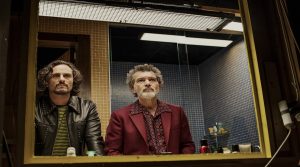
Dolor y gloria (English title: Pain and Glory)
It is a 2019 Spanish drama film directed and written by Pedro Almodóvar. It stars Antonio Banderas, Asier Etxeandia, Penélope Cruz, Julieta Serrano and Leonardo Sbaraglia. The film narrates a series of reencounters of Salvador Mallo, a film director in his decline. Some of these reencounters are physical, some others are remembered: his childhood in the 1960s, when he emigrated together with his family to Paterna in search of prosperity, the first desire, his first adult love in Madrid in the 1980s, the pain of the breakup of this relationship, writing as a therapy to forget, the premature discovery of cinema, facing the impossibility of continuing filming, etc.
In cinemas across the UK.

La casa de papel (English title: Money Heist)
A criminal mastermind who goes by «The Professor» has a plan to pull off the biggest heist in recorded history — to print billions of euros in the Royal Mint of Spain. To help him carry out the ambitious plan, he recruits eight people with certain abilities and who have nothing to lose. The group of thieves take hostages to aid in their negotiations with the authorities, who strategize to come up with a way to capture The Professor. As more time elapses, the robbers prepare for a showdown with the police.
Watch it on Netflix

Elisa y Marcela (English title: Elisa & Marcela)
It is a 2019 Spanish biographical romantic drama film directed by Isabel Coixet. Starring Natalia de Molina and Greta Fernández, the film tells the story of Elisa Sánchez Loriga and Marcela Gracia Ibeas, two women who passed as a heterosexual couple in order to marry in 1901 at Church of Saint George in A Coruña becoming the first same-sex matrimony recorded in Spain.
Watch it on Netflix

Las chicas del cable (English title: Cable Girls)
It is a Spanish period drama web television series. It stars Ana Fernández, Nadia de Santiago, Blanca Suárez and Maggie Civantos. In 1928, a modern telecommunications company begins to operate in Madrid. The series tells the turn in life that four young women take when they start working for this company. The four of them feel attached in different ways, to their families, their partners, or their memories. Part of the focus of the show is the hardships working women faced in the 1920s.
Watch it on Netflix
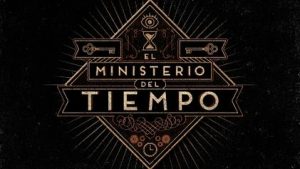
El ministerio del tiempo (English title: The Ministry of Time)
It is a Spanish fantasy television series created by Javier and Pablo Olivares. The series follows the exploits of a patrol of the fictional Ministry of Time, which deals with incidents caused by time travel.
Watch it on Netflix

La casa de las Flores (English title: The House of Flowers)
It is a Mexican comedy-drama web television series created by Manolo Caro. It depicts a dysfunctional upper-class Mexican family that owns a prestigious flower shop
Watch it on Netflix

Cuéntame cómo pasó (English title: Remember When)
It is a Spanish television drama series which has been broadcast on La 1 of Televisión Española since 2001. It is the longest running prime-time series in the history of television in Spain.
Watch it on A la Carta-RTVE
Mesa redonda – Buñuel, Lorca, Dalí: cultura, biografía y legado / Open table discussion – Buñuel, Lorca, Dalí: Culture, Biography and Legacy
¿Cómo construir una vida por medio de una película? ¿Cómo influyó el sistema de valores de la Residencia de Estudiantes de Madrid -donde vivieran Luis Buñuel, Federico García Lorca y Salvador Dalí a principios de la década de 1920- en el trabajo de los tres artistas? Para sellar la temporada cinematográfica del ICA «Luis Buñuel: estética de lo irracional», reunimos a un grupo de expertos en cultura con el fin de analizar la relación particular de Lorca, Buñuel y Dalí, y la forma de la que artistas y directores de cine han intentado captar tanto la estética revolucionaria de los tres artistas como su valiosísimo legado cultural.
El actor Nickolas Grace (quien diera vida a Lorca en el largometraje de Bardem en 1995, «Lorca, muerte de un poeta»), los directores Mike Dibb (El espíritu de Lorca, BBC Arena 1986; La fama y humillación de de Salvador Dalí, BBC Arena 1996) y Pablo Romero (Universidad de Roahampton, actualmente inmerso en un nuevo proyecto sobre Las Hurdes de Buñuel junto con Dibb), y la académica y traductora Sarah Wright (Royal Holloway, University of London), se reúnen con María Delgado (Royal Central School of Speech and Drama, University of London) para hablar de la cultura, biografía y legado de Buñuel, Dalí y Lorca.
Dónde: Instituto Cervantes de Londres – 102 Eaton Square, London SW1W 9AN
Cuándo: miércoles 2 de diciembre 2015, 18:30h
______________________________________
What does it mean to construct a life through film? How did the unique ethos of Madrid’s Residencia de Estudiantes where Luis Buñuel, Federico García Lorca and Salvador Dalí all lived during the early 1920s influence the creative work of all three artists? To mark the ICA’s ‘Luis Buñuel: Aesthetics of the Irrational’ film season, this panel brings together a group of different cultural critics to examine the unique relationships between Lorca, Buñuel and Dalí, and the ways in which artists and filmmakers have sought to ‘capture’ both the ground-breaking aesthetics of the three artists and their unique cultural legacy.
Actor Nickolas Grace (who played Lorca in Bardem’s 1995 film Lorca, muerte de un poeta), filmmakers Mike Dibb (The Spirit of Lorca, BBC Arena 1986; The Fame and Shame of Salvador Dalí, BBC Arena 1996) and Pablo Romero (University of Roehampton, currently working on a new film on Buñuel’s Las Hurdes with Dibb), and academic and translator Sarah Wright (Royal Holloway, University of London) join Maria Delgado (Royal Central School of Speech and Drama, University of London) to discuss the culture, biography and legacy of Buñuel, Dalí and Lorca.
Where: Instituto Cervantes London – 102 Eaton Square, London SW1W 9AN
When: Wednesday 2 December 2015, 6.30 pm
BFI LONDON FILM FESTIVAL, del 7 al 18 de octubre / BFI LONDON FILM FESTIVAL, 7-18 October
Hoy da comienzo el evento referencia del cine en el Reino Unido y uno de los festivales de cine más antiguos del mundo: el BFI London Film Festival, del Instituto Británico de Cine. Hasta el día 18 de octubre, presentará al público de Londres y del resto del país (un público más numeroso en cada edición) lo mejor de las últimas producciones cinematográficas británicas e internacionales. Con un programa intenso como pocos, que ofrece a directores y líderes de opinión eventos en cada ámbito de la industria cinematográfica, el BFI London Film Festival (LFF) posiciona Londres com la capital mundial de la creatividad.
El Instituto Cervantes de Londres apoya las películas españolas y latinoamericanas incluidas en el programa general del festival.
Información y entradas: www.bfi.org.uk/lff
______________________________________________________
Today is the first day of Britain’s leading film event and one of the world’s oldest film festivals: BFI London Film Festival, by the British Film Institute. From now and until 18 October, it will introduce the finest new British and international films to an expanding London and UK-wide audience. With this year’s industry programme stronger than ever, offering international filmmakers and leaders a programme of insightful events covering every area of the film industry, the BFI London Film Festival (LFF) positions London as the world’s leading creative city.
Instituto Cervantes supports the Spanish and Latin American films included in the general programme of the festival.
Tickets and further information: www.bfi.org.uk/lff
